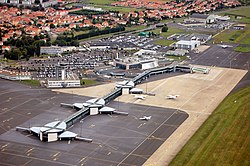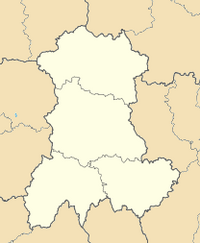Clermont-Ferrand Auvergne Airport
Clermont-Ferrand Auvergne Airport Aéroport de Clermont-Ferrand Auvergne | |||||||||||||||||||
|---|---|---|---|---|---|---|---|---|---|---|---|---|---|---|---|---|---|---|---|
| File:LFLC logo.png | |||||||||||||||||||
 | |||||||||||||||||||
| Summary | |||||||||||||||||||
| Airport type | Public | ||||||||||||||||||
| Operator | CCI de Clermont-Ferrand / Issoire | ||||||||||||||||||
| Location | Clermont-Ferrand | ||||||||||||||||||
| Elevation AMSL | 1,090 ft / 332 m | ||||||||||||||||||
| Coordinates | 45°47′09″N 003°09′45″E / 45.78583°N 3.16250°E | ||||||||||||||||||
| Website | clermont-aeroport.com | ||||||||||||||||||
| Maps | |||||||||||||||||||
 Location of Auvergne region in France | |||||||||||||||||||
Location of airport in Auvergne region | |||||||||||||||||||
 | |||||||||||||||||||
| Runways | |||||||||||||||||||
| |||||||||||||||||||
| Statistics (2018) | |||||||||||||||||||
| |||||||||||||||||||
Sources: Aeroport.fr[1] | |||||||||||||||||||
Clermont-Ferrand Auvergne Airport (French: Aéroport de Clermont-Ferrand Auvergne) (IATA: CFE, ICAO: LFLC) is an airport serving the French city of Clermont-Ferrand. It is located 6.7 km (3.6 nautical miles) east of the city, in Aulnat, both communes of the Puy-de-Dôme department in the Auvergne region of France, in the middle of France. It is the main airport of the Auvergne region, the others are Aurillac airport and Le-Puy-en-Velay airport. In 2013, the airport handled 416,600 passengers making it the 29th busiest airport in France.
History
In 1916 the first hard runway was built on this site (now runway 08/26), the first terminal would open at the airport a few years later in 1937. The terminal had a size 200m². In 1975 the runway was extended to its current 3,015 m. A year later in 1976 the airport had a category 3 ILS system installed.[2] The current terminal was built in 1992.
The airport used to be the hub of Regional Airlines, an important regional airline in France. [citation needed] Regional Airlines was bought by Air France in 2000 and Air France moved Regional's hub (now Hop!) to the airport of Lyon St Exupéry, about a hundred kilometers away.
Over 1 million passengers went to Clermont-Ferrand Auvergne airport in 2002, with more than 30 destinations in France and in Europe. Today, there are only 14 destinations at the airport and 400,295 passengers in 2015. In 2013, Ryanair started flights to Porto (due to the large Portuguese community in the area), which has been a surprising success.
Facilities
The airport resides at an elevation of 1,090 feet (332 m) above mean sea level. It has one asphalt paved runway designated 08/26 which measures 3,015 by 45 metres (9,892 ft × 148 ft), plus two grass runways: one parallel to 08/26 which measures 909 by 50 metres (2,982 ft × 164 ft) and one designated 01/19 which measures 705 by 60 metres (2,313 ft × 197 ft).[3] The passenger terminal is 17 600 m2 large.
Airlines and destinations
The following airlines operate regular scheduled and charter flights to and from Clermont-Ferrand:[4]
| Airlines | Destinations |
|---|---|
| Air Corsica | Seasonal: Ajaccio |
| Air France | Paris–Orly Seasonal: Nice (begins 4 July 2020)[5] |
| Air France Hop | Paris–Charles de Gaulle Seasonal: Bastia, Figari |
| Ryanair | Lisbon, London–Stansted, Porto |
| TUI fly Belgium | Seasonal: Marrakesh[6] |
Incidents
- On 28 December 1971, Vickers Viscount F-BOEA of Air Inter was damaged beyond economic repair when it departed the runway on a training flight during a simulated failure of #4 engine.[7]
- On 27 October 1972, Air Inter Flight 696, Vickers Viscount 724 F-BMCH, en route from Lyon to Clermont-Ferrand, crashed 4 km west of Noirétable during bad weather; 60 on board died, 8 survived. The subsequent investigation determined that the accident was caused by the flight crew's failure to notice that their plane's radio compass had shifted 180 degrees, most likely the result of electrical discharges in the rainstorm they were flying through. The crew may have followed the erroneous reading as they attempted to fly an approach pattern using Clermont-Ferrand's non-directional beacon (NDB). The aircraft descended too early and struck a mountain 44 km (27 mi) east of the airport.[8]
References
- ^ "Résultats d'activité des aéroports français 2018" (PDF). aeroport.fr. Retrieved 31 August 2019.
- ^ http://www.clermont-aeroport.com/index.php?page=airport
- ^ LFLC – CLERMONT FERRAND AUVERGNE. AIP from French Service d'information aéronautique, effective 31 October 2024.
- ^ clermont-aeroport.com - Destination map Archived 2017-08-01 at the Wayback Machine retrieved 14 May 2017
- ^ Liu, Jim. "Air France S20 Short-Haul Network additions as of 28JAN20". Routesonline. Retrieved 29 January 2020.
- ^ https://www.tuifly.be/en/destinations/morocco/marrakech
- ^ "Accident description". Aviation Safety Network. Retrieved 8 October 2009.
- ^ "Accident description". Aviation Safety Network. Retrieved 6 April 2010.
External links
- Airport website
- Clermont-Ferrand Auvergne Airport (official site - corporate) (in French)
- Aéroport de Clermont-Ferrand - Auvergne (Union des Aéroports Français) (in French)
- Template:WAD
- Accident history for CFE at Aviation Safety Network

